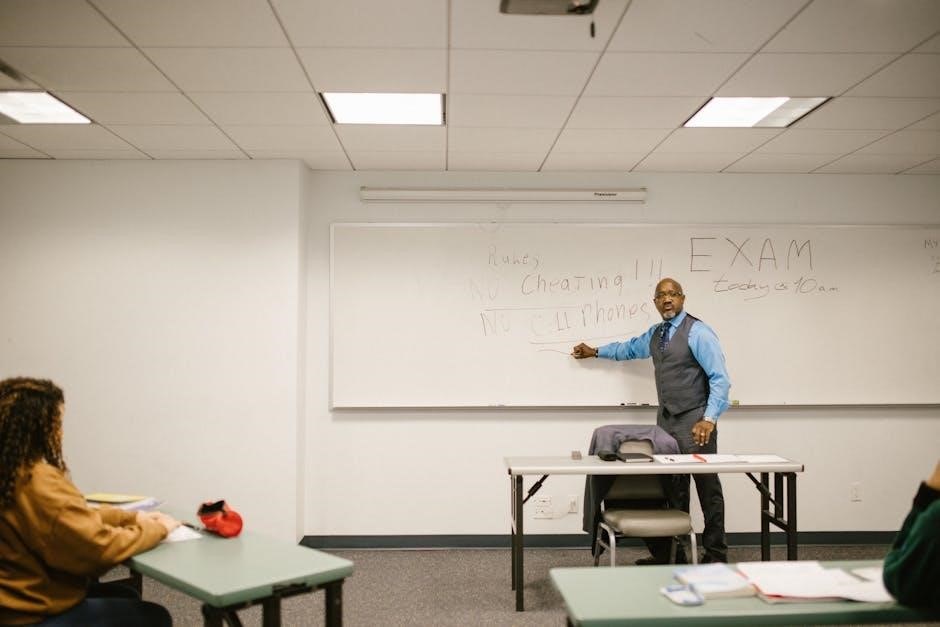The IBEW Journeyman Lineman Test is a critical certification process for electric lineworkers, assessing their expertise in electrical systems, safety protocols, and practical skills essential for the trade.
1.1. Overview of the Test
The IBEW Journeyman Lineman Test is a comprehensive certification exam designed to evaluate the knowledge and skills of electric lineworkers. It assesses their understanding of electrical theory, safety codes, and practical applications. The test is rigorous, ensuring that candidates demonstrate competence in areas critical to the trade. It covers a wide range of topics, from the National Electric Code (NEC) to transformer systems and distribution. The exam is a key step for lineworkers seeking to advance their careers and meet industry standards. Passing the test signifies a high level of proficiency, enabling professionals to perform complex tasks safely and effectively. This certification is essential for maintaining the integrity and reliability of electrical systems nationwide.
1.2. Importance of the Test for Linemen
The IBEW Journeyman Lineman Test is crucial for linemen as it validates their expertise and readiness for advanced roles in the electrical trade. Passing the exam demonstrates a thorough understanding of electrical systems, safety protocols, and industry standards, which are essential for performing high-voltage tasks safely and effectively. It also signifies a lineman’s commitment to professional excellence, enhancing their credibility and career opportunities. The certification often leads to higher earning potential, greater respect in the field, and the ability to take on more complex projects. By ensuring linemen meet rigorous standards, the test contributes to public safety and the reliability of electrical infrastructure. It is a cornerstone for advancing in the profession and maintaining the trust of employers and communities.
1.3. Key Skills and Knowledge Required
The IBEW Journeyman Lineman Test requires a blend of theoretical knowledge and practical skills. Candidates must be proficient in the National Electric Code (NEC), electrical theory, and transformer operations. They should understand distribution systems, circuit analysis, and safety protocols. Practical skills include climbing, equipment operation, and troubleshooting. Knowledge of safety codes, such as OSHA regulations, is critical. Problem-solving abilities and the capacity to interpret technical diagrams are also essential. Familiarity with tools and materials commonly used in the trade is necessary. Strong communication and teamwork skills are vital for coordinating tasks and ensuring workplace safety. Mastery of these areas ensures linemen can perform their duties safely and effectively.

Understanding the Test Format
The IBEW Journeyman Lineman Test features multiple-choice questions and practical scenarios designed to assess technical knowledge and problem-solving skills in real-world electrical lineman tasks.
2.1. Types of Questions and Exam Structure
The IBEW Journeyman Lineman Test consists of multiple-choice questions, scenario-based problems, and calculation tasks. These questions evaluate theoretical knowledge, problem-solving skills, and practical application of lineman duties. The exam is divided into sections, each focusing on specific areas such as electrical theory, safety protocols, and system operations. Candidates are provided with a set time limit to complete the test, ensuring they manage their time effectively. The structure is designed to simulate real-world challenges, requiring quick and accurate decisions. Understanding the format helps candidates prepare strategically, focusing on both technical accuracy and time management. Proper preparation ensures they can tackle each question type confidently and efficiently.
2.2. Time Management and Duration
The IBEW Journeyman Lineman Test typically lasts approximately 4-5 hours, depending on the exam format and the number of questions. Candidates are advised to allocate their time wisely, ensuring they address all sections without rushing. Proper time management is crucial, as the test includes both theoretical and practical questions requiring careful consideration. It is recommended to skim through the exam first to identify easier questions, allowing candidates to maximize their score efficiently. Effective time management strategies, such as allocating specific minutes per question and avoiding prolonged focus on a single problem, can significantly improve performance. Practicing under timed conditions during study sessions is highly encouraged to build this skill.
2.3. Passing Score and Grading Criteria
The passing score for the IBEW Journeyman Lineman Test is typically 70-75%, though this may vary slightly depending on the exam version or regional requirements. Grading is based on a candidate’s ability to demonstrate comprehensive knowledge of electrical systems, safety protocols, and practical problem-solving skills; The test is scored by evaluating correct answers, with no penalties for incorrect responses. Candidates are assessed on their understanding of the National Electric Code (NEC), electrical theory, and hands-on applications. To achieve a passing score, it is crucial to focus on high-weightage areas, such as safety codes and transformer systems. Consistent study and practice are essential for success.

Eligibility Requirements
- Completion of an approved apprenticeship program.
- Documentation of relevant work experience.
- Valid certifications in electrical work.
- Age and educational prerequisites.
- Background checks and physical assessments.
3.1. Educational and Training Background
To qualify for the IBEW Journeyman Lineman Test, candidates must demonstrate a strong educational and training foundation. Completion of an IBEW-approved apprenticeship program is typically required, combining classroom instruction with hands-on experience. These programs cover essential topics such as electrical theory, safety protocols, and the National Electric Code (NEC). Additionally, many candidates hold a high school diploma or equivalent, with coursework in math and science being highly beneficial. The training emphasizes practical skills and theoretical knowledge, ensuring linemen are well-prepared for the challenges of the job and the certification exam. This educational background is critical for mastering the complexities of the trade.
3.2. Work Experience and Apprenticeship
Work experience and apprenticeship are critical components for qualifying to take the IBEW Journeyman Lineman Test. Candidates typically need to complete an IBEW- or NJATC-approved apprenticeship program, which combines hands-on training with classroom instruction. These programs usually last four years and include approximately 8,000 hours of on-the-job experience and 1,000 hours of related classroom training. During this time, apprentices learn essential skills such as pole climbing, equipment operation, and electrical system maintenance. Additionally, direct work experience in the trade is often required, ensuring candidates have practical knowledge of safety procedures, electrical systems, and industry standards. Completing an apprenticeship is generally a prerequisite for certification;
3.3. Required Certifications and Licenses
Obtaining specific certifications and licenses is a mandatory step to qualify for the IBEW Journeyman Lineman Test. Candidates must hold a valid Journeyman Lineman certification, which is typically awarded upon completing an apprenticeship program. Additionally, many jurisdictions require a commercial driver’s license (CDL) due to the nature of the job involving heavy equipment and vehicle operation. OSHA certification is also commonly required to ensure adherence to safety standards. Some states or employers may require additional certifications, such as first aid or hot work permits. Staying informed about local and industry-specific requirements is essential to meet all eligibility criteria for the exam and subsequent employment.

Key Content Areas to Study
Focus on mastering the National Electric Code (NEC), electrical theory, transformers, and distribution systems. Understand safety codes and best practices to ensure comprehensive preparation for the exam.
4.1. National Electric Code (NEC)
The National Electric Code (NEC) is a critical component of the IBEW Journeyman Lineman Test. It provides standardized rules for safe electrical design, installation, and inspection. Linemen must understand NEC requirements for conductor sizing, voltage drop calculations, and overcurrent protection. Familiarize yourself with Articles 90, 100, 110, and 220, as these pertain to electrical systems, circuits, and safety practices. Pay attention to grounding and bonding principles, as they are essential for ensuring system safety. Understanding NEC tables, such as those for ampacity and conduit fill, is also vital. Mastery of the NEC ensures compliance with industry standards and enhances your ability to perform tasks safely and efficiently. Regular updates to the NEC mean staying current is crucial for both the exam and real-world applications.
4.2. Electrical Theory and Fundamentals
Electrical theory and fundamentals form the cornerstone of a lineman’s expertise. Understanding Ohm’s Law, which relates voltage, current, and resistance, is essential. Kirchhoff’s Laws, governing energy conservation in circuits, are critical for analyzing electrical networks. Power calculations, including single-phase and three-phase systems, are vital for determining system performance. Inductance and capacitance principles explain how circuits store and release energy. Transformers, a mainstay in power distribution, require a solid grasp of their operation and application. Familiarity with magnetic fields and their interaction with currents ensures a deeper comprehension of circuit behavior. Mastery of these concepts, along with safety principles, is crucial for linemen to work efficiently and safely. Regular review of these fundamentals will enhance problem-solving skills and ensure adherence to industry standards.
4.3. Transformers and Distribution Systems

Understanding transformers and distribution systems is critical for IBEW journeyman linemen. Transformers are essential for stepping up or stepping down voltages to meet system requirements. Knowing how to calculate transformer ratios, impedance, and efficiency is vital. Distribution systems involve the infrastructure that delivers electricity from substations to consumers, including transmission lines, circuit breakers, and reclosers. Familiarity with three-phase systems and their configurations ensures proper operation and maintenance. Knowledge of voltage regulation, load balancing, and fault current analysis is also necessary. Studying transformer connections, such as delta and wye configurations, and their applications in distribution systems is key. Understanding these concepts ensures safe and efficient power delivery, adhering to NEC standards and industry best practices.
4.4. Safety Codes and Best Practices
Safety codes and best practices are paramount for IBEW journeyman linemen. The National Electric Safety Code (NESC) and Occupational Safety and Health Administration (OSHA) regulations govern safe work practices. Understanding proper procedures for climbing, working at heights, and using personal protective equipment (PPE) is essential. Knowledge of arc flash safety, lockout/tagout protocols, and electrical hazard identification is critical. Familiarity with industry standards for equipment operation and maintenance ensures compliance and reduces risks. Staying updated on safety codes and following best practices minimizes workplace accidents and ensures the well-being of linemen and the public. Adhering to these guidelines is a cornerstone of professional responsibility in the trade.

Effective Study Strategies
Develop a structured study schedule, prioritize difficult topics, and use active learning techniques like flashcards. Focus on understanding concepts, not just memorizing. Regular practice tests and consistent review of mistakes improve retention and confidence. Incorporate visual aids and real-world examples to enhance comprehension. Stay organized, avoid cramming, and maintain a healthy work-study balance to ensure long-term success.
5.1. Recommended Textbooks and Resources
Essential study materials include the National Electric Code (NEC) handbook, which is a cornerstone for electrical safety and practices. Textbooks like “Electrical Theory for Journeyman Lineman” and “Power Systems and Transformers” provide in-depth knowledge. The IBEW Study Guide for Journeyman Lineman is tailored for exam preparation, covering test-specific topics. Additionally, online resources such as IBEW.org and LinemanHub.com offer practice problems and study aids. Utilizing ElectricSmarts and lineman forums can enhance understanding of complex concepts. Supplementing with workbooks focused on electrical calculations and safety protocols ensures comprehensive preparation.
5.2. Online Courses and Tutorials
Online courses and tutorials are invaluable for structured learning. Platforms like Udemy and Coursera offer comprehensive programs on electrical theory, safety protocols, and lineman-specific skills. The IBEW Training Center provides certified courses tailored to the exam, ensuring alignment with test content. Websites like ElectricSmarts and Lineman Central host tutorials and webinars on topics such as transformer calculations and distribution systems. Additionally, YouTube channels dedicated to lineman training offer visual explanations of complex concepts. These resources complement traditional study materials, allowing candidates to reinforce their knowledge through interactive and engaging formats. Utilizing these tools enhances both theoretical understanding and practical application, boosting exam readiness.
5.3. Practice Tests and Mock Exams
Practice tests and mock exams are essential for assessing readiness and identifying weak areas. The IBEW and third-party websites offer official practice tests that mimic the exam format. These resources include multiple-choice questions, calculations, and scenario-based problems. Websites like TestGuide and LinemanExam provide realistic simulations, helping candidates familiarize themselves with the test structure and timing. Regularly taking mock exams improves time management, reduces anxiety, and sharpens problem-solving skills. Reviewing incorrect answers and understanding the reasoning behind correct ones reinforces learning. Consistent practice with these tools ensures a strong foundation and confidence for the actual exam.

Test-Taking Tips
- Manage time effectively, allocating minutes per question based on difficulty.
- Read each question carefully, ensuring understanding before answering.
- Eliminate incorrect options for multiple-choice questions to increase accuracy;
- Highlight key terms in questions to focus on critical details.
- Stay calm and maintain a clear mindset throughout the exam.
6.1. Time Management During the Exam
Effective time management is crucial for success on the IBEW Journeyman Lineman Test. Plan your exam strategy in advance to ensure you cover all sections without rushing. Allocate a specific amount of time to each question based on its difficulty, reserving extra minutes for complex problems. Start by skimming through the entire exam to identify easier questions, which you can answer quickly to save time for challenging ones later. Avoid spending too long on a single question, as this can disrupt your overall pacing. Finally, leave a few minutes at the end to review your answers and make necessary adjustments. Proper time management reduces stress and increases your chances of achieving a high score;
6.2. Strategies for Multiple-Choice Questions
Mastering multiple-choice questions is essential for success on the IBEW Journeyman Lineman Test. Start by carefully reading each question and identifying key terms or concepts. Eliminate obviously incorrect answers first to narrow down your options. If you’re unsure, use the process of elimination to make an educated guess. Pay attention to absolute words like “always” or “never,” as these often indicate incorrect answers. Use the knowledge gained from your studies to analyze each option logically. Additionally, avoid changing answers unless you’re certain your initial choice was wrong. Confidently applying these strategies will help you navigate the exam with precision and accuracy.
6.3. Reducing Exam Stress and Anxiety

Reducing exam stress and anxiety is crucial for optimal performance on the IBEW Journeyman Lineman Test. Begin by practicing relaxation techniques such as deep breathing or mindfulness to calm your nerves. Ensure you are well-rested and maintain a healthy diet in the days leading up to the exam. Familiarize yourself with the test format and location to minimize day-of anxiety. During the exam, take short breaks between sections to recharge. Visualize success and remind yourself of your preparation. Focus on the present moment and tackle one question at a time. Stay positive and avoid negative self-talk. Remember, stress is natural, but managing it effectively will help you stay focused and confident.

Post-Test Process
After passing the IBEW Journeyman Lineman Test, candidates receive certification, validating their expertise. Certification must be maintained through continuing education and adherence to industry standards, ensuring professionalism.
7.1. Obtaining Certification
Upon passing the IBEW Journeyman Lineman Test, candidates are awarded certification, recognizing their mastery of electrical line work. The certification is issued by the International Brotherhood of Electrical Workers (IBEW) and is highly regarded in the industry. To obtain the certification, successful candidates must complete the exam and meet all eligibility requirements. The certification process typically involves submitting passing scores, verifying work experience, and paying any applicable fees. Once certified, journeyman linemen gain enhanced job opportunities, higher earning potential, and professional credibility. The certification also demonstrates a commitment to safety, knowledge, and skill in the trade, making it a valuable asset for career advancement.
7;2. Maintaining Certification and Continuing Education
Maintaining IBEW Journeyman Lineman certification requires completing continuing education to stay current with industry standards and safety protocols. Certified linemen must meet periodic renewal requirements, which typically include a specified number of hours in approved training programs. These programs cover updates to the National Electric Code, advancements in technology, and best practices in electrical line work. Employers often support continuing education through apprenticeships, workshops, or online courses. Additionally, linemen must adhere to safety training and recertification in areas like first aid and aerial lift operations. Continuous learning ensures competence, safety, and compliance with evolving industry regulations, ultimately benefiting both the individual and the profession as a whole.
8.1. Final Tips for Success

To excel on the IBEW Journeyman Lineman Test, stay confident and focused. Thoroughly review all study materials, especially weak areas. Practice under timed conditions to simulate exam pressure. Prioritize safety protocols and electrical theories, as they are heavily emphasized. Join study groups or forums for shared insights and advice. Ensure a well-rested mind by getting adequate sleep before the test. Maintain a positive mindset and avoid last-minute cramming. Trust your training and experience, and approach each question methodically. Remember, consistent effort and preparation are key to achieving certification and advancing your career as a lineman.
8.2. The Role of the IBEW Journeyman Lineman in the Industry
IBEW Journeyman Linemen play a vital role in maintaining and developing the electrical infrastructure that powers communities. They are skilled professionals responsible for installing, repairing, and maintaining high-voltage power lines and electrical systems. Their expertise ensures reliable electricity delivery, supporting industries, homes, and essential services. By adhering to safety standards and best practices, they protect themselves and the public from potential hazards. The certification underscores their commitment to excellence and continuous learning, making them indispensable in the energy sector. Their work directly contributes to the safety, efficiency, and progress of modern society, ensuring the electrical grid remains robust and adaptable to future demands.
